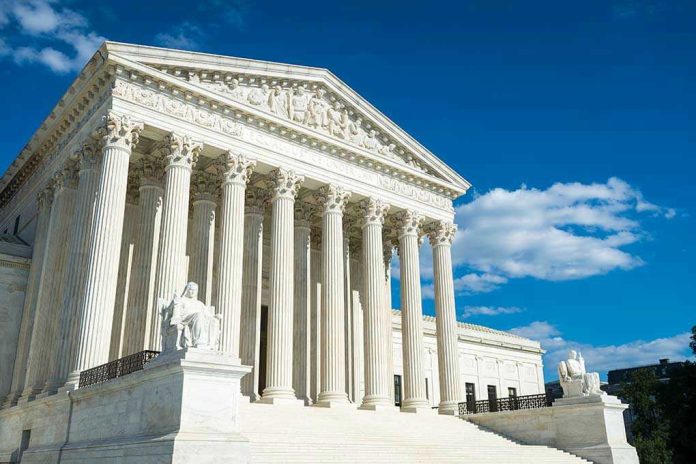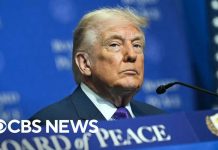
In a sharp constitutional clash, a federal judge has blocked President Trump’s White House from withholding $4 billion in foreign aid, spotlighting a brewing battle over Congress’s exclusive authority to control federal spending.
Story Snapshot
- A federal court ruled the Trump administration cannot freeze $4 billion in foreign aid appropriated by Congress.
- The administration’s unprecedented “pocket rescission” faces legal and constitutional challenges over executive power.
- Congressional leaders and watchdogs warn this move threatens the foundational “power of the purse.”
- The Supreme Court is now asked to decide whether the executive or legislative branch controls U.S. spending.
Court Blocks Executive Bid to Freeze Foreign Aid
A federal district court issued an injunction ordering the Trump administration to release $4 billion in foreign aid funds previously approved by Congress. This ruling came after the administration attempted to unilaterally withhold the funds through a rarely used “pocket rescission” procedure. The court found this move violated Congress’s constitutional authority over federal spending, a principle enshrined in Article I, Section 9 of the U.S. Constitution. The decision has put the spotlight on a fundamental question: who truly controls the nation’s wallet—Congress or the President?
The administration’s action is unprecedented in recent decades, reviving legal and political debates over the separation of powers. While the President has long sought greater control over federal spending, Congress, with bipartisan backing, has fiercely defended its “power of the purse.” The Government Accountability Office and key lawmakers, such as Senate Appropriations Chair Susan Collins, have criticized unilateral executive attempts to withhold appropriated funds as clear violations of statutory and constitutional law. The issue has echoes of past clashes, including the 2019 border wall funding fight and the 1974 Impoundment Control Act, which was designed to curb such executive overreach.
Supreme Court Drawn Into Power Struggle
After the lower court’s rebuke, the Trump administration quickly appealed to the Supreme Court, arguing that the injunction forces the executive branch into a “war with itself” by compelling spending the President seeks to rescind. The administration maintains that its actions are necessary to advance policy objectives and ensure responsible foreign aid spending, especially when Congress refuses to act. However, the lower court’s order remains in effect, requiring the funds to be disbursed unless Congress formally cancels them. As of September 2025, the Supreme Court has not yet issued a ruling, leaving the executive’s power to withhold spending in legal limbo and placing future presidential authority over appropriations in doubt.
This case arrives amid a broader environment of constitutional tension. The Supreme Court has recently expanded presidential powers in other domains, prompting experts to warn about the erosion of checks and balances. Legal scholars and the Government Accountability Office widely agree that only Congress—not the President—can rescind funds, and warn that allowing unilateral executive rescissions would undermine a core pillar of American self-government. Nonetheless, some conservative legal voices contend that the executive needs more flexibility, particularly in foreign policy, to respond rapidly to changing global circumstances.
Implications for Conservative Values and Governance
The court’s intervention has serious implications for taxpayers, accountability, and the future of limited government. If the Supreme Court upholds the lower court’s ruling, the immediate effect will be the forced release of $4 billion in foreign aid, regardless of the President’s objections. This could weaken executive leverage over international spending and embolden Congress to dictate even more terms on appropriations. In the long run, the decision may set a precedent that further restricts presidential discretion, potentially opening the door to more unchecked federal spending and bureaucratic expansion—developments that have long frustrated advocates of smaller government and constitutional restraint.
Meanwhile, U.S. agencies like USAID and the State Department, as well as foreign aid recipients and contractors, face uncertainty over the fate of these funds. Nonprofits and organizations dependent on U.S. foreign aid are caught in the crossfire, with the ultimate impact hinging on the Supreme Court’s forthcoming decision. The broader lesson is clear: the battle over who controls America’s purse strings is far from over, and the outcome will shape the balance of power in Washington for years to come.
For conservatives, this case is more than a legal technicality—it’s a test of whether the constitutional system of checks and balances can withstand judicial activism and congressional overreach. If the executive branch is stripped of its ability to rein in questionable spending, it could set a troubling precedent for future presidents seeking to uphold fiscal discipline or resist globalist spending agendas. The path forward will be determined not just by the courts, but by the willingness of Americans to defend the limits on government power established by the Founders.
Sources:
Trump Administration Asks Supreme Court to Let It Block $4B in Foreign Aid Funding
Trump administration asks Supreme Court to let it freeze $4B in foreign aid
Spotlight: The Uncertain Future of the Separation of Powers









